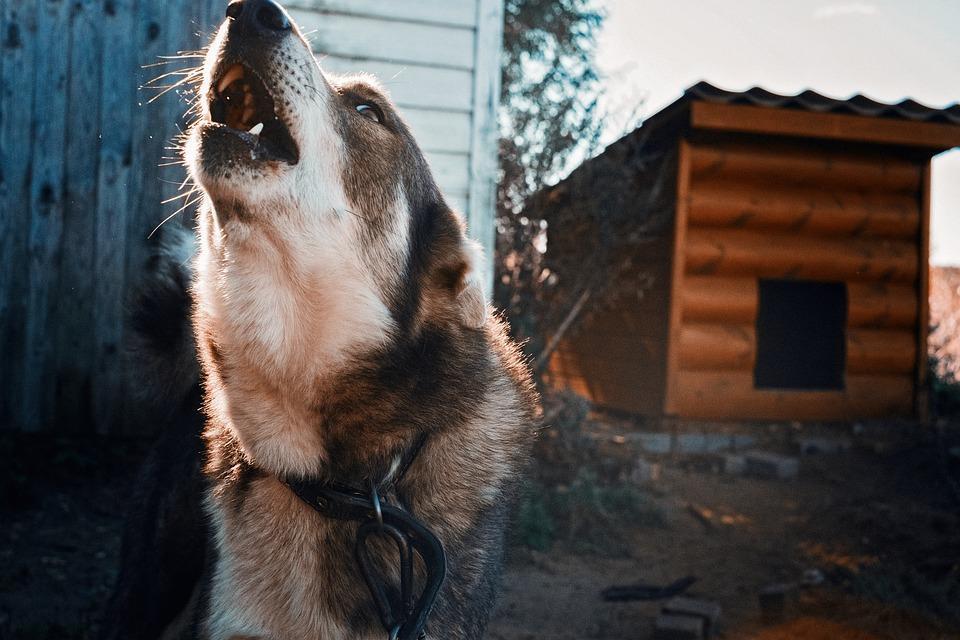Why Dogs Howl to Songs?



See files for Dogs
Have you ever found yourself passionately singing a power ballad, only to be unexpectedly accompanied by your dog's howl? Or perhaps a similar scenario has unfolded while you practiced an instrument or belted out tunes in the shower. This amusing yet puzzling behavior, where dogs howl to music, is a common phenomenon that often leaves dog owners bewildered.
In this AnimalWised article, we delve into this intriguing issue and seek to answer why dogs howl at music and what can be done about it.
What does it mean when a dog howls?
While wolves may be the first to come to mind when we hear howling, dogs also utilize this vocalization. Distinct from barking, howling is a long, drawn-out sound that can travel significant distances. It serves as another tool in a dog's communication toolbox, expressing a wider range of emotions and messages than barks alone.
The evolutionary origins of dog howling lie with their wild ancestors, wolves. In pack animals like wolves, howling plays a crucial role in social cohesion and territorial defense. Long-distance communication is essential for wolves to locate pack members across vast territories, assemble for hunting, or warn off rival packs.
Dogs, descended from wolves, have inherited this ancestral vocalization. However, with domestication, the context and purpose of howling have shifted.
While both howling and barking are vocalizations, they serve distinct purposes. Barking is typically used for more immediate communication with humans or other dogs in proximity. It can express a range of emotions like excitement, alarm, or territorial defense, but with a shorter and more varied sound structure compared to howls.
Howling, on the other hand, is specifically designed for long-distance communication. It often conveys emotions like loneliness, fear, or a desire for attention, particularly when directed towards a dog's human family. Additionally, dogs might use howls in response to certain sounds, even those we can't hear.

Why do dogs howl at music?
Dogs exhibit a fascinating behavior known as musical howling, where they vocalize in response to certain types of music. This howling can vary in pitch and intensity, triggered by instruments like violins, flutes, or even singing voices.
The reasons behind musical howling in dogs are not fully understood, but several hypotheses exist:
- Emotional response: music might evoke emotions in dogs, leading them to express themselves through howling. Sad melodies could elicit mournful howls, while upbeat music might trigger playful vocalizations.
- Mimicry: dogs are skilled at mimicking sounds and social cues. The long, sustained notes in music may be interpreted as vocalizations to be mimicked.
- High-pitched sounds: some instruments, particularly those with high frequencies, might resemble sounds that naturally trigger howling in dogs, such as sirens or emergency vehicles.
It's important to remember that dogs likely don't experience music in the same way humans do. Their reactions are more likely based on specific sounds or emotions triggered by the music itself.
This makes sense when we consider their remarkable sense of hearing. Dogs can detect a much wider range of frequencies, particularly at the higher end of the spectrum, compared to humans. This heightened sensitivity likely plays a role in how they respond to music.
Studies further support this idea, suggesting that dogs might react differently to various genres. Some dogs might find classical music calming, while others exhibit increased activity when upbeat tempos fill the air.
Also, while not a definitive indicator, excessive howling or howling accompanied by other unusual behaviors might warrant a veterinary consultation.
Confused by your dog's howling at ambulances? Unravel the mystery and learn how to interpret their vocalizations in this other article.
What to do if your dog is howling at music?
Here are some steps you can take if your dog is howling at music:
- Observe their body language: are they relaxed and wagging their tail, or do they seem anxious or stressed (pacing, whining)?
- Consider the music: is it a genre known to be calming (classical) or stimulating (upbeat pop)?
- Adjust the volume: if the howling seems triggered by loudness, try lowering the volume.
- Change the genre: if the music itself seems to be the issue, try playing a different genre that might be more calming or engaging for your dog.
- Offer an alternative outlet: provide a chew toy or puzzle feeder to redirect their energy if the howling seems playful or attention-seeking.
- Provide a safe space: if your dog appears distressed, allow them to leave the room and find a quiet place to relax.
- Start slow and gradually: if you're introducing music for the first time, begin with low volumes and observe their response.
Remember, every dog is an individual. By observing their behavior and trying these strategies, you can help them have a positive experience with music or minimize any negative reactions.
In our next article, we explore the fascinating science behind the melodies and noises that capture your dog's attention and spark joy. Discover what sounds most dogs love and how you can use them to enrich their lives.

If you want to read similar articles to Why Dogs Howl to Songs?, we recommend you visit our Facts about the animal kingdom category.







